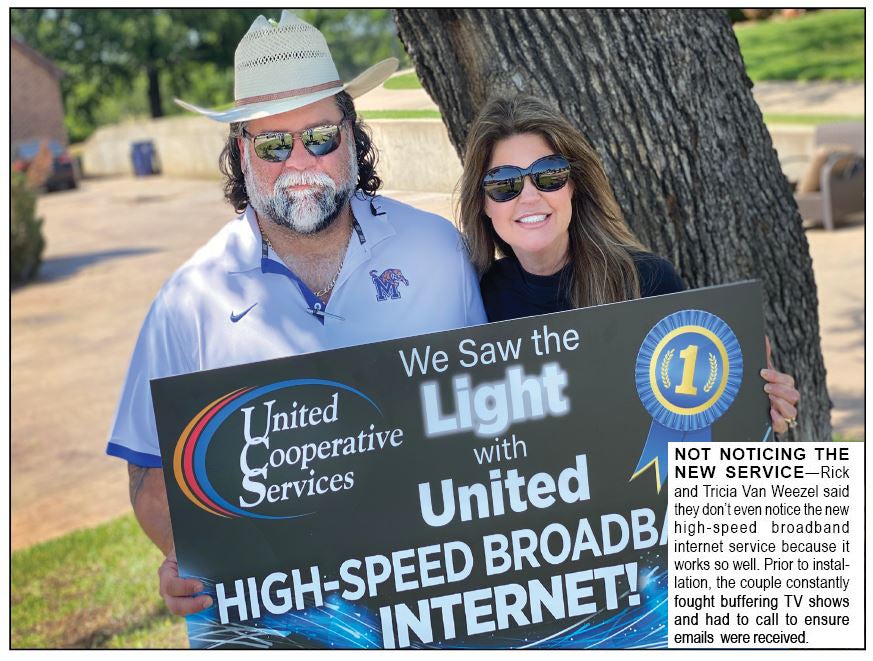First United High-Speed Internet Testers
Say ‘Surf’s Up’ on the Web
by
JOHN DAVIS
When he found the broadband ballot in his September issue of Texas Co-op Power magazine last year, he couldn’t believe his good luck.
Henry Greene, an enterprise imaging administrator senior at Texas Health Huguley Hospital Fort Worth South, said he was surprised to learn high-speed internet could become a real possibility for him in his fairly rural home in east Burleson. He made sure he voted “yes” and hand-delivered his ballot to the Burleson office.
Now days away from becoming one of United Cooperative Services’ first 100 beta testers, he said he can hardly wait to experience the speed he needs to do his job from home.
Learn More About United's High-Speed Internet
“It’s true, I did offer to dig a trench for the fiber in my neighborhood,” Greene joked. “And I would have really done it, too. I didn’t care if it would have taken me a week.”
So far, the beta testing period has gone well, and officials have already uncovered areas to improve upon with subscriber devices, said Marcellus Nixon, United’s vice president of broadband services.
The beta test period is important to allow Nixon’s team to test United’s internal processes, from installation techniques, testing services, service scheduling and subscriber device configurations, he said. With each subscriber install, broadband officials learn and improve on an install-by-install basis.
“The subscribers for which we have completed installation have responded very favorably for our service offering,” Nixon said. “The performance of the service has exceeded their expectations. I am very thankful that we built in a test period into our project roll out. Although we will be looking for ways to continuously improve, the beta process will help us polish out the finished product for when we do begin lighting up paying members.”
A Matter of Service
At the hospital, Greene oversees 12 servers for the imaging department. Several weeks ago, he and fellow IT colleagues were installing Microsoft patches throughout the system—a job reserved for the early-morning hours to minimize downtime.
Because of the slowness of the internet service at his home, the process took him much longer than for others doing the same job. By 6:30 a.m., he finally finished, and then started his normal 8-hour day shift.
“If I would click something on the screen, it would take about five seconds for it to display on the server,” he said. “If I had faster internet, a delay that long wouldn’t exist. The other team members on the call had faster internet than I did, and they did double or triple the number of servers that I could do. I was getting a lot of pity from those guys. But when they found out that I’d be getting 1 gig symmetrical service soon, they were all a little envious.”
While it’s true Greene might have preferred going to bed earlier than he had been accustomed to because of his slow internet connection, the real reason he said he needs a faster connection is to provide a better level of care to the patients. That’s a goal that Greene said is paramount to every aspect of his career duties. Slow internet isn’t acceptable, he said, especially considering the file sizes of different types of medical imaging and the fact that all imaging is done digitally these days.
“The quicker the internet, the faster I can solve whatever problem I can that’s affecting patient care,” he said. “When something goes wrong at 2 or 3 in the morning, I’m the person they call. My current internet service, while functional, it’s not ideal.
“It’s very important to me to provide excellent patient care. My own family goes to that hospital. If you went to Huguley, you’ll see a sign in our lobby that reads, ‘We are people serving people like those we love the most.’ I want to take care of our patients as much as my own family. I want to live that. And having that 1 gig speed has me feeling better about being able to do that. It makes me feel good.”
Finally In the Game
For 11-year-old Jaggar Purselley, there’s nothing worse than glitching out. He’s said he’s glitched out and died falling off buildings more times than he can count.
“It’s, like, frustrating,” he said.
Playing video games is one of his favorite pastimes on his Xbox One, and he said many games have been ruined because of the lag of his parents’ former internet service that left him in the lurch more than once.
“It’s just fun to hop on with friends,” he said about playing video games. “You can do a lot of fun stuff with different games and your friends. But some days, it would just glitch-out all over the place. It was very bad.”
Originally, video games played just fine. Then, the problems started with Fortnite Season 7, he said. The game is a cooperative shooter-survival game where players fight zombie-like creatures. On season 12 as of press time, Jaggar said the game was becoming impossible to play with each new season.
“Now I hardly ever glitch-out at all,” he said. “It’s definitely a big improvement. I was hardly able to play, and now I don’t lag at all.”
Jaggar’s father, Jimmy, who owns a construction company, said he remembered his son becoming upset with the lagging games and his own experience trying to enjoy movies prior to the fiber upgrade.
“We can actually watch TV and stream movies where we couldn’t before,” Jimmy said. “We used to have to tell Jaggar, ‘All right, you have to get off the game so we can finish watching this movie. Now, I don’t have to listen to him gripe all the time about losing because the game lagged and he died. There’s definitely a substantial difference. I was a bit skeptical at first because the other company told us there’s nothing that could be done. So far, United’s internet has worked perfectly.”
Not Even Noticed
Tricia Van Weezel said she doesn’t even notice her new fiber-to-the-home connection.
That’s a good thing though, she said, because she shouldn’t notice a utility. Prior to installation, she and her husband, Rick, noticed all the time how their previous internet service never performed to expectations. It was just a fact of life she said they’d learned to accept.
The Van Weezels became the first household to receive beta service on May 18.
“When we built the house 12 years ago, who knew how dependent we would be on the internet,” she asked. “Who also could ever have guessed that cable was going to be so obsolete? Who needs that anymore? Today, the internet has become a utility. It’s a non-option. I think that in the last 10 years, there’s been a huge renaissance change on things, and the internet is now considered a utility. It’s the first question some people will ask about if they’re buying or renting a new property.
“So, we never had just a steady flow of wonderful internet. There was always some sort of connection error. Our internet never ran on a plain green light of dependable service. It was always a yellow light. It made our email so that we couldn’t rely on it. When we would send an email, we always had to make a phone call to make sure they got the email, which is redundant. It was just unpredictable. As a utility, it shouldn’t be.”
Though the couple owns several businesses, Van Weezel said she and her husband primarily used their home internet service for family gaming, watching TV and sending emails.
Watching movies also was difficult, she said, as videos viewed on services such as Netflix would buffer, spoiling the experience.
That changed with the new fiber connection, she said. Once connected, Van Weezel said the difference was like night and day.
“After everything was hooked up, well, let’s put it this way. In a matter of minutes, it was something we didn’t notice anymore," she said. "We immediately started taking our internet for granted like water or electricity. There were no hiccups, no speed issues, no circles running through TV shows and no lagging of email. It was like wearing a great shoe. You just don’t notice it. And I don’t want to notice it or have conversations about it not working again.”



